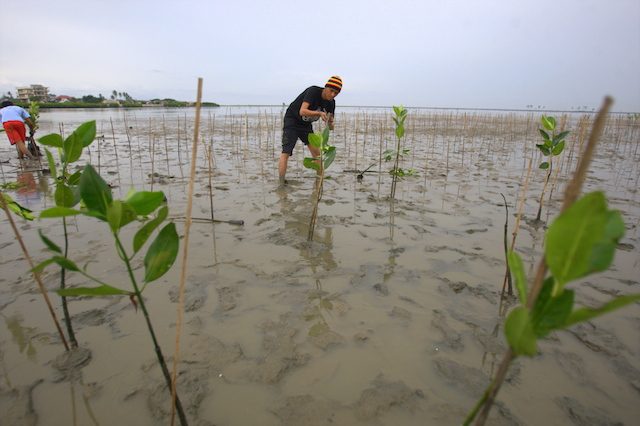SUMMARY
This is AI generated summarization, which may have errors. For context, always refer to the full article.

Preventing the loss of Indonesian mangroves would help in the global fight against climate change, new research shows.
The study, published recently in Nature Climate Change, estimated that if Indonesia halts mangrove deforestation it could reduce its total greenhouse gas emissions by between 10% to 31%.
That would be globally significant, since Indonesia is among the world’s highest contributors to global emissions – ranked 12th in the world in 2012, according to European Commission figures, behind others led by China, the US, and the European Union, and just ahead of Australia.
The study also points to Indonesia’s large-scale shrimp industry, worth US$1.5 billion a year, as being a driver in mangrove deforestation. Many mangroves in Indonesia are being converted into shrimp ponds.
Deforestation is a major national and international challenge. As well as being one of Indonesia’s biggest sources of greenhouse gas emissions, many other studies have found that the loss of forests worldwide is a significant contributor to global greenhouse emissions.
The research team, led by Daniel Murdiyarso from the Center for International Forestry Research, showed that mangroves in Indonesia stores 3.14 billion metric tons of carbon – or one-third of global coastal carbon stock.
The study explains that mangroves are important because of their high rates of tree and plant growth, coupled with anaerobic, water-logged soils that slow decomposition, resulting in large, long-term carbon storage. Mangroves store three to five times more carbon than rainforests.
But over the past three decades, Indonesia has lost 40% of its mangroves.
In 2005, Indonesia had 2.9 million hectares of mangroves, or almost a quarter of global mangrove ecosystems. That’s down from in 1980, when there were 4.2 million hectares of mangroves.
Indonesia has pledged to cut its greenhouse emissions to 26% by 2020.
According to Professor Murdiyarso, deforestation of Indonesian mangroves contributes to almost half of the global carbon emissions from the destruction of coastal ecosystems, which including marshes, mangroves, and sea grasses. Every year, Indonesia loses around 52,000 hectares of mangroves.
The study is significant due to the “magnitude of the [carbon] stock and the magnitude of emission rate,” Murdiyarso said.
The research team assessed carbon stocks of 38 mangroves plots located in eight sites across the archipelago.
The research team measured the carbon storage in the leaves and roots of mangroves. “Mangroves have a very unique root system above the ground,” Murdiyarso said.
The team also measured carbon storage in the soil by drilling two to three meters underground to collect samples for lab analysis.
The team used deforestation estimates with a stock-change approach to estimate emissions from land use, as well as mitigation potentials.
Tien Wahyuni, a researcher from the Indonesian Ministry of Forestry and Environment’s Dipterocarps Research Center, said that Indonesian mangroves face various threats.
“Mangroves are being converted for shrimp and fish ponds. But there are other threats as well. In urban areas they are destroyed for land reclamation for residential areas,” she said.
She said the new study on mangroves was important. “Mangroves have a lot of biomass because their roots go deep into the ground.” —Rappler.com
Add a comment
How does this make you feel?





There are no comments yet. Add your comment to start the conversation.